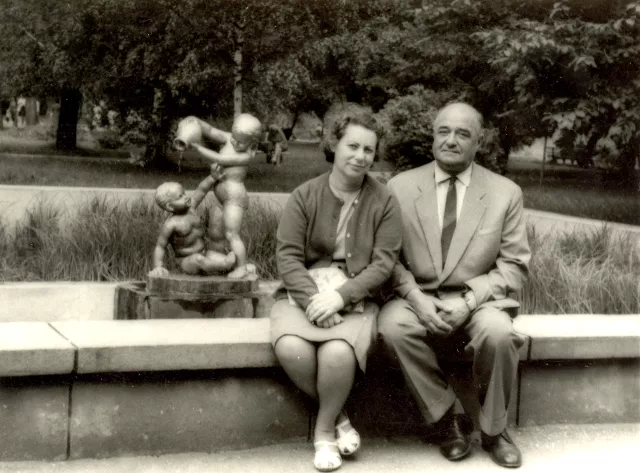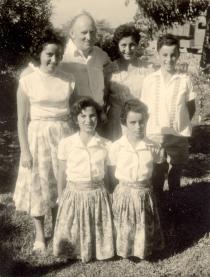Raya Teytelbaumene with her husband Fayvel Teytelbaum
This is my husband, Fayvel Teytelbaum, and I, Raya Teytelbaumene, in the early 1960s at the resort in Druskninkiai.
In the early 1950s, when anti-Semitic campaigns were in full swing, Jews were dismissed from managing positions, and even arrested. All papers and mass media spoke of doctors-murderers; my husband was called by his boss and openly told that all Jews were considered harmful, besides he had not joined the Party and thereby had proved that he disdained Soviet ideology. Fayvel was fired. These were our black days. He took it very hard. He would stay in bed all day long with his face turned to the wall. Soon, in 1953 Stalin died. Neither I nor my husband shed any tears. I think Fayvel was one of the few who understood Stalin’s role in arrests and execution of innocent people. I started getting that too. Neither my husband nor I were rehabilitated. Anyway, I don’t think he would have accepted the offer from the prosecution as he had been offended there.
Soon my husband was offered a job as a butcher on the central market. He had to agree to it. He decided that he would work there temporarily, but it turned out so that Fayvel worked there until his retirement. He was physically strong and it was a peace of cake for him. Well, I should say, it was rather lucrative, even a prestigious job in the Soviet time. We lived comfortably thanks to that. Our son went to school, and I decided that I could also work. I sold my cattle just in time, as soon it was banned to keep cattle in Kaunas, and I found a job as a cashier at the same place where my husband worked: the central market. I worked there for eight years.
Every year we went on vacation. Usually we were in Palanga and Druskininkai. Usually we got privileged trade union trip vouchers. If we couldn’t do that, we went to the resorts and rented a room from local people. We loved holidays, but, we mostly celebrated family ones, like birthdays or memorable days. Soviet holidays – 7th November, 1st May – were also celebrated in our house. Jewish traditions and holidays were rarely observed. I strove to celebrate at least Pesach. There was always matzah for that holiday at home, though everybody ate bread too.























